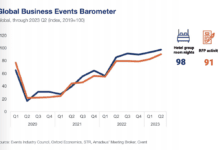
Here are some questions to ask to avoid any unwelcome surcharge surprises when it comes time to pay the final bill.
No meeting planner loves fees and surcharges — especially those that they weren’t aware of before the final bill comes due.
Prevue recently caught up with leading hospitality consultant, educator and voice for inclusive meetings Joan Eisenstodt, Principal of Washington, D.C.–based Eisenstodt Associates, LLC, to get her take on the seeming proliferation of add-on fees — and questions planners can ask to inform themselves so they don’t get surprised when the final bill comes due. (This is the second in a two-part series. See part 1 here.)
Prevue: What questions should planners ask to avoid getting surprised by fees and surcharges they weren’t aware of?

Eisenstodt: It’s about being an investigative planner who asks deeper questions. If a service is provided and it doesn’t list a charge, ask if there is one. An example would be for cashiers or bartenders for bars — how much per hour? Is it offset by sales? If we add hours, what is the charge? Is there a minimum number of hours?
Another example would be AV labor. If you use an outside AV company, are there patch (to the sound system) fees? Are they taxed? Is there an administrative fee? Is that taxed? If we need a secure storage room — for any reason — is there a cost for rental? To change the locks?
Prevue: What about concessions? There’s no cost associated with those, right?
Eisenstodt: Nothing is free! Concessions are not free gestures of goodwill from a hotel in thanks for the business, though planners too often think they are. Those concessions come with a cost to the hotel. The list of concessions in a proposal is likely to have a value attached and a condition — meeting some percentage of guest room occupancy, F&B minimum, etc. What happens if the group still wants a concession but doesn’t meet the conditions? What are the charges and what are the charges on those charge (tax, for example)?
Prevue: Is it possible to negotiate any of these fees? If so, any tips on how to go about it?
Eisenstodt: The standard line is “everything is negotiable,” to which I add, “some of the time” and “it depends.” Every meeting is different in very specific ways, and groups need to prioritize what matters most to them and ask the hotels with which they negotiate how they make their money and what matters to them.
If we negotiate with knowledge and willingness to listen, and if we take the time to really understand, we often do better. If we continue taking shortcuts of less-thorough requests for proposal (RFPs), if we limit clarifying conversations, and if hotels are forcing salespeople to book biz quickly and not spend time answering questions, then negotiating is more difficult.
RFPs should spell out the timeframe for decisions, as well as the priorities. Hotels need to provide information up front, rather than face the wrath of an irate customer saying that the terms were not disclosed before the contract was signed.
I’m not a lawyer and this is not legal advice, but I will say to always ask your hospitality attorney how best to negotiate terms on pricing. I try to negotiate something like “all prices, policies, terms and conditions under control of the hotel are spelled out in the contract. Any that are not disclosed and agreed to will not be imposed.” Again, not to be a) taken verbatim and b) assumed to be included. Negotiations are a time to understand better the RFP needs and the proposal terms.
Prevue: What other issues should planners be taking into consideration?
Eisenstodt: It has always frustrated me that dollar figures matter more to many planners and groups than the terms and conditions. If the terms and conditions are not clear, they can impact the charges.
I’m often called in when a group realizes what they signed is not so good — that is, the terms and conditions are not clear — and they want me to attempt to renegotiate for clarity. I rarely renegotiate to change prices.
Two examples of my very favorite language from two different clients’ signed contracts are:
“AV Services: Should the [Group name] elect to use an outside audiovisual company, there will be a charge to the Group.”
This one is fascinating because it is the entirety of the contract language on AV for a 500-person meeting, and the group had used an outside AV company for their meetings for 25 years. After reading this, I called the group to ask about their expectations. They said “Oh they won’t charge us; they never have.” The hotel, when I called, said it would be more than $35k — and that was in pre-2000 dollars.
From a different contract:
“GUEST ROOM RATES: Room rates are quoted exclusive of applicable state and local taxes (which are currently 13% + $3 per room per night) or applicable service, or hotel specific fees in effect at the Hotel at the time of the meeting.”
The rates themselves were quoted elsewhere. The issue is that the hotel used the word “or” instead of “and.” The hotel said, “Well you know what we mean,” to which I responded, “I know what it says.” More, the charges and to what they apply are not spelled out. I love reading and when one takes time to read more than once and slowly, it becomes apparent.
You May Also Be Interested In…
Enough With Those Pesky Hidden Fees!
Todays’ Seller’s Market: Hotelier, Planners Weigh In
Florida Travel Advisories: What Planners Need to Know










